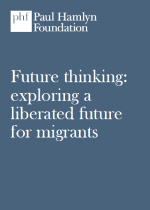New Musical Futures pilot develops teaching methods for ‘free instruments’
While funding to music and the arts suffers cuts, and school music departments struggle for resources within schools, a pilot project from Musical Futures is focusing on the two ‘instruments’ that all school pupils already have: the voice and the mobile phone.
Launching today, the national scheme will trial new teaching strategies and resources for Year 7 pupils based on singing and mobile phone music-making apps. After being oversubscribed with applications to take part in the trial, Musical Futures is inviting interested teachers to road-test the new resources via an online training, networking and support programme, prior to them being made freely available to all music departments in May.
Abigail D’Amore, project lead for Musical Futures, said: “We’re aiming to involve as many music teachers as we can in the development of these new resources, which could transform the way music is taught in Year 7 classrooms. Using pupils’ mobile phones for exploring and creating music may help break down barriers to young people getting involved in music at school – hopefully leading to them taking up real instruments as their confidence grows.”
Ofsted, in its ‘Wider Still and Wider’ report last year, highlighted the need for better quality teaching of singing and music technology in schools. The pilot scheme will address each of these issues. In partnership with The Sage Gateshead, the vocal strand will focus on showing pupils how they can use their voices as instruments. The music technology strand will involve expert Phil Heeley supporting teachers to help them use readily available, free mobile phone apps to engage their pupils in creative composition. The pilot faces severe barriers as many schools ban the use of mobile phones in classrooms, despite their potential as highly creative learning tools.
Musical Futures works to develop and support innovative teaching and learning practices in secondary schools. Set up by the Paul Hamlyn Foundation in 2003, it has developed a set of tools to help teachers get their students engaged in practical music making. Now used in some form in around half of English secondary schools, it has been found to greatly increase the uptake of music in schools and lead to more pupils taking music at Key Stage 4.
Over 100 schools applied to take part in the new projects. Unsuccessful applicants, and any other schools that want to get involved, are being recruited as ‘co-pilots’ to try out the resources in their classes as they are developed and report back on their effectiveness through the Musical Futures website. The website will also host online discussions and support sessions with experts.


